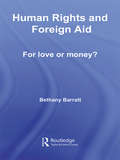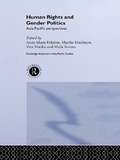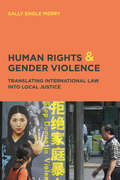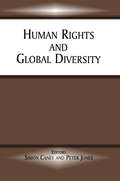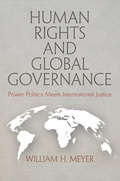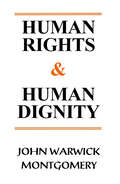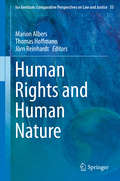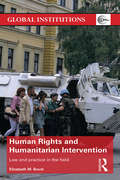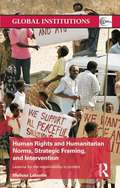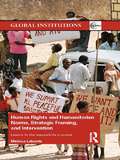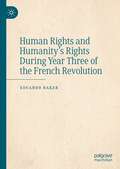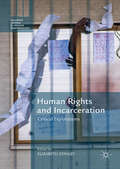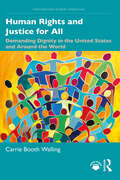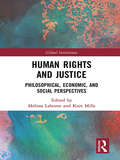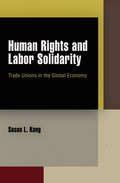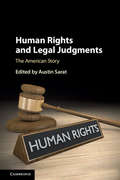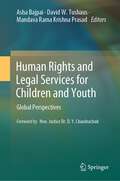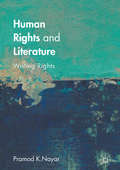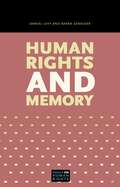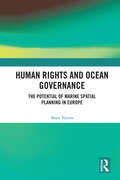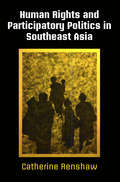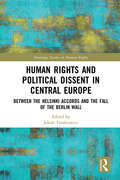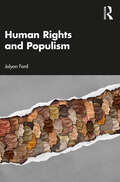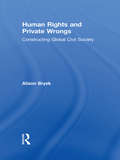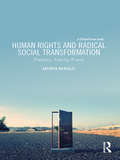- Table View
- List View
Human Rights and Foreign Aid: For Love or Money? (Routledge Research in Human Rights)
by Bethany BarrattBy trying to alleviate poverty abroad, foreign development assistance tries to meet, among other things, basic human needs, which some schools of thought classify as basic human rights. However, because development abroad has often been treated as a tool for the pursuit of donor interests, rather than as an end to itself, it often ends up not only neglecting basic human rights, but making them worse. Bethany Barratt develops this argument by presenting a systematic external examination of the internal documentation of aid rationale in three major donor countries (Britain, Canada and Australia). The book sets the discussion of these documents in the context of the foreign policy process and structure of each donor, and contrasts it with the results of statistical analyses of key factors in aid. It shows that different criteria are applied to the various categories of recipient states, resulting in an inconsistent treatment of recipient rights as an aid criterion. While the book demonstrates important gulfs between rhetoric and reality, between elected policymakers and aid implementing agencies, and between the donors themselves, it comes to relatively optimistic conclusions about the general direction of foreign assistance and its increasingly pure focus on poverty alleviation. This substantive and important book will be invaluable to students, researchers and policymakers in the fields of politics, economics and development.
Human Rights and Gender Politics: Asia-Pacific Perspectives (Routledge Advances in Asia-Pacific Studies #Vol. 5)
by Vera Mackie Martha Macintyre Anne-Marie Hilsdon Maila StivensIn recent years, the slogan "women's rights are human rights" has become a central claim of the of the global women's movement. Human Rights and Gender Politics: Asia-Pacific Perspectives examines the critical issues raised by this embracing and expansion of the human rights discourse by feminists worldwide.This volume challenges the conventional, ungendered and male-centred analysis of the politics of human rights and addresses the future of global feminisms. It is essential reading for all those interested in learning more about human rights and women's rights in the Asia-Pacific region.
Human Rights and Gender Violence: Translating International Law into Local Justice
by Sally Engle MerryIn this study that investigates the tensions between global law and local justice, Sally Engle Merry offers an insider's perspective on how human rights law holds authorities accountable for the protection of citizens even while reinforcing and expanding state power.
Human Rights and Global Diversity
by Peter Jones Simon CaneyThis examination of global society focuses on its conflict with local societies and questions whether the human race should be treated as belonging to a single global community. It considers the universality of human rights and its conflict with group claims to self-determination.
Human Rights and Global Governance: Power Politics Meets International Justice (Pennsylvania Studies in Human Rights)
by William H. MeyerInternational human rights have been an important matter for study, policy, and activism since the end of World War II. However, as William H. Meyer observes, global governance is not only a relatively new topic for students of interational relations but also a widely used yet often contested concept. Despite the conflicting and often politicized uses of the term, three key dimensions of global governance can be identified: the impact of diplomatic international organizations such as the International Criminal Court, the importance of nonstate actors and global civil society, and global political trends that can be gleaned from empirical observation and data collection. In Human Rights and Global Governance, Meyer defines global governance generally as the management of global issues within a political space that has no single centralized authority.Employing a combination of historical, quantitative, normative, and policy analyses, Meyer presents a series of case studies at the intersection of power politics and international justice. He examines the global campaign to end impunity for dictators; the recognition, violation, and protection of indigenous rights; the creation and expansion of efforts to ensure corporate social responsibility; the interactions between labor rights and development in the Global South; just war theory as it applies to torturing terrorists, war crimes in Afghanistan and Iraq, and the drone wars; and the global strategic environment that best facilitates the making of human rights treaties. Meyer concludes with an evaluation of the successes and failures of two exemplary models for the global governance of human rights as well as recommendations for public policy changes and visions for the future.
Human Rights and Human Dignity
by John Warwick MontgomeryNo one is against human rights. It is obviously a good thing-until one starts to think about the meaning of the term and its implications. Then it shows itself to be an idea that polarizes, encouraging uncritical support and also extreme reaction from both secularists and religionists. John Warwick Montgomery, who is both a lawyer and a theologian, is uniquely qualified to address the question of human rights. In clear, easily understood language, he analyzes what human rights are and addresses the crucial question, "How can human rights, properly understood, be legitimated?" Montgomery shows that is there is a foundation for human rights, it must be sought in a transcendent perspective, in the revelational content of the Bible.
Human Rights and Human Nature
by Thomas Hoffmann Marion Albers Jörn ReinhardtThis book explores both the possibilities and limits of arguments from human nature in the context of human rights. Can the concept of human nature provide a basis for understanding fundamental rights? Is it plausible to justify the claim to universal validity of human rights by reference to human nature? Or does the idea of human rights in its modern, post-1945 manifestation go, in essence, beyond human nature? The essays in this volume introduce naturalistic positions and their concomitant critiques. They address the role that human nature both actually does and potentially may play in forming a foundation for and acting as an exemplification of fundamental rights. Beyond that, they give attention to the challenges caused by Life Sciences. Human nature itself is subject to transformation and transgression in an unprecedented manner. The essays reflect on issues such as reproduction, species manipulation, corporeal autonomy and enhancement. Contributors are jurists, philosophers and political scientists from Germany, Switzerland, Turkey, Poland and Japan.
Human Rights and Humanitarian Intervention: Law and Practice in the Field (Global Institutions)
by Elizabeth M. BruchHuman rights, peacekeeping, and humanitarian intervention have emerged in the past decades as important components of international law and practice. Adopting a methodology of Institutional Ethnography informed by Actor-Network Theory, this book traces the practices of law and expertise from global IGO headquarters to the ‘field’ and back again, and through various contemporary field missions from Bosnia to Afghanistan and East Timor to Sierra Leone. It answers several fundamental questions: How is human rights law engaged in ‘establishing the peace,’ ‘rebuilding the nation,’ and ‘restoring the rule of law’ in post-conflict situations? How do human rights experts use law in their everyday work in the context of humanitarian intervention? How are law and expertise established, sustained and transformed in the field? Offering a complex and nuanced explanation of humanitarian intervention based upon a multi-dimensional understanding of law and power, this book will be of interest and use to scholars, students and practitioners in international law and policy, human rights, and humanitarian intervention. Its cross-disciplinary approach should also appeal to the professional communities engaged directly and indirectly with projects of humanitarian intervention – including staff at inter-governmental organizations, international lawyers and practitioners, and activists.
Human Rights and Humanitarian Norms, Strategic Framing, and Intervention: Lessons for the Responsibility to Protect
by Melissa LabonteThis book seeks to examine the effects of strategic framing in U.S. and UN policy arenas to draw conclusions regarding whether and how the human rights and humanitarian norms embedded within such frames resonated with decision-makers and, in turn, how they shaped variation in levels of political will concerning humanitarian intervention in three cases that today would qualify as Responsibility to Protect (R2P) cases: Somalia, Rwanda, and Sierra Leone. Labonte concludes that in order for humanitarian interventions to stand a higher likelihood of being effective, states advocating in support of such actions must find a way to persuade policymakers by appealing to both the logic of consequences (which rely on material and pragmatic considerations) and logic of appropriateness (which rely on normatively appropriate considerations) – and strategic framing may be one path to achieve this outcome.
Human Rights and Humanitarian Norms, Strategic Framing, and Intervention: Lessons for the Responsibility to Protect (Global Institutions)
by Melissa LabonteThe human rights and humanitarian landscape of the modern era has been littered with acts that have shocked the moral conscience of mankind, and there has been wide variation in whether, how, and to what degree states respond to mass atrocity crimes, even when they share similar characteristics. In many cases concerned states responded, either through moral suasion; gentle or coercive diplomacy; or other non-forcible measures, to prevent or halt the indiscriminate human rights violations that were occurring. In others, states simply turned away and left the vulnerable to their fate. And still yet in other cases, states responded robustly, using military force to stop the atrocities and save lives. This book seeks to examine the effects of strategic framing in U.S. and UN policy arenas to draw conclusions regarding whether and how the human rights and humanitarian norms embedded within such frames resonated with decision-makers and, in turn, how they shaped variation in levels of political will concerning humanitarian intervention in three cases that today would qualify as Responsibility to Protect (R2P) cases: Somalia, Rwanda, and Sierra Leone. Labonte concludes that in order for humanitarian interventions to stand a higher likelihood of being effective, states advocating in support of such actions must find a way to persuade policymakers by appealing to both the logic of consequences (which rely on material and pragmatic considerations) and logic of appropriateness (which rely on normatively appropriate considerations) – and strategic framing may be one path to achieve this outcome. Offering a detailed and examination of three key cases and providing some an original and important contribution to the field this work will be of great interest to students and scholars alike.
Human Rights and Humanity’s Rights During Year Three of the French Revolution
by Eduardo BakerThis book explores the constitutional debates of the Year 3 of the French Revolution (also known as Year 1 of the French Republic) and the drafts for the Declaration and the Constitution of 1793. It presents the revolutionaries’ distinct view on human rights and the rights of the peoples, as well as their philosophical underpinnings. After discussing how contemporary legal history and theory, and political philosophy approached the revolutionary period, the book tackles the main topics covered during the debates and proposals. Starting with the issue of external relations and the sovereignty of the people and ending with natural rights and Republicanism, this book shows how apparently technical questions (such as what procedure should be implemented to declare a war) are intertwined with philosophical reflections on rights and with problems that were urgent at the time.
Human Rights and Incarceration: Critical Explorations (Palgrave Studies in Prisons and Penology)
by Elizabeth StanleyThis collection considers human rights and incarceration in relation to the liberal-democratic states of Australia, New Zealand and the UK. It presents original case-study material on groups that are disproportionately affected by incarceration, including indigenous populations, children, women, those with disabilities, and refugees or ‘non-citizens’. The book considers how and why human rights are eroded, but also how they can be built and sustained through social, creative, cultural, legal, political and personal acts. It establishes the need for pragmatic reforms as well as the abolition of incarceration. Contributors consider what has, or might, work to secure rights for incarcerated populations, and they critically analyse human rights in their legal, socio-cultural, economic and political contexts. In covering this ground, the book presents a re-invigorated vision of human rights in relation to incarceration. After all, human rights are not static principles; they have to be developed, fought over and engaged with.
Human Rights and Justice for All: Demanding Dignity in the United States and Around the World
by Carrie Booth WallingHuman rights is an empowering framework for understanding and addressing justice issues at local, domestic, and international levels. This book combines US-based case studies with examples from other regions of the world to explore important human rights themes – the equality, universality, and interdependence of human rights, the idea of international crimes, strategies of human rights change, and justice and reconciliation in the aftermath of human rights violations. From Flint and Minneapolis to Xinjiang and Mt. Sinjar, this book challenges a wide variety of readers – students, professors, activists, human rights professionals, and concerned citizens – to consider how human rights apply to their own lives and equip them to be changemakers in their own communities.
Human Rights and Justice: Philosophical, Economic, and Social Perspectives (Global Institutions)
by Melissa Labonte Kurt MillsThe relationship between human rights and justice is significant, deep, and ultimately contested. The two terms themselves – human rights and justice – have experienced both conceptual and operational pushback from many quarters in recent years. Although an understanding of justice is inherent in broad human rights discourses, there is no clear consensus on how to integrate and reconcile these concepts – both as a means of advancing knowledge and as a mechanism for the development of sound and effective policy at the global, regional, and national levels. Further, expansions of the boundaries of both human rights and justice make any clear and settled understanding of the relation difficult to ascertain. This volume tackles these issues in a coherent and complementary manner. It examines a range of philosophical, economic, and social perspectives that are key to understanding the nature of the linkages between human rights and justice, written by scholars who are at varying stages of their careers, and whose ongoing work has sparked dialogue and exchange within and across these fields. This work will be of interest to students and scholars of human rights, international relations and ethics.
Human Rights and Labor Solidarity
by Susan L. KangFaced with the economic pressures of globalization, many countries have sought to curb the fundamental right of workers to join trade unions and engage in collective action. In response, trade unions in developed countries have strategically used their own governments' commitments to human rights as a basis for resistance. Since the protection of human rights remains an important normative principle in global affairs, democratic countries cannot merely ignore their human rights obligations and must balance their international commitments with their desire to remain economically competitive and attractive to investors.Human Rights and Labor Solidarity analyzes trade unions' campaigns to link local labor rights disputes to international human rights frameworks, thereby creating external scrutiny of governments. As a result of these campaigns, states engage in what political scientist Susan L. Kang terms a normative negotiation process, in which governments, trade unions, and international organizations construct and challenge a broader understanding of international labor rights norms to determine whether the conditions underlying these disputes constitute human rights violations. In three empirically rich case studies covering South Korea, the United Kingdom, and Canada, Kang demonstrates that this normative negotiation process was more successful in creating stronger protections for trade unions' rights when such changes complemented a government's other political interests. She finds that states tend not to respect stronger economically oriented human rights obligations due to the normative power of such rights alone. Instead, trade union transnational activism, coupled with sufficient political motivations, such as direct economic costs or strong rule of law obligations, contributed to changes in favor of workers' rights.
Human Rights and Legal Judgments: The American Story
by Austin SaratHuman rights can be defined as the basic fundamental rights inherent to all human beings in any society. How these rights are made available and protected in individual countries is an area of much study and debate. Focusing on the significance of human rights in American law and politics, this book seeks to understand when, where, and how American law recognizes and responds to claims made in the name of human rights. How are they used by social movements as they advance rights claims? When are human rights claims accommodated and resisted? Do particular kinds of human rights claims have greater resonance domestically than others? What cultural and psychological factors impede the development of a human rights culture in the United States? This is an exciting and engaging volume that will appeal to a broad range of scholars, practitioners, and students interested in the study of human rights.
Human Rights and Legal Services for Children and Youth: Global Perspectives
by Asha Bajpai David W. Tushaus Mandava Rama Krishna PrasadThis book discusses legal services clinics and various other access-to-justice initiatives that are established to protect and represent the rights and interests of children and youth in several countries across the globe. These could include legal services or access-to-justice clinics run by government or universities or community. The book has contributions from academicians, lawyers, researchers and legal professionals from several counties including India, UK, USA, Brazil, Australia, Indonesia, Poland, and Spain, which discuss how they represent children and youth in their countries. The book looks at how these access-to-justice initiatives currently provide assistance, what are the child friendly justice procedures they use, and best practices that can be replicable in other jurisdictions. The chapters contain findings of field research studies, some case studies, and models related to these topics. There are recommendations on ways to strengthen access-to-justice and legal services for empowering children and youth. The main goal is to create a resource for readers who want to expand child advocacy opportunities in their own universities and communities. The reader may also learn how to conduct legislative advocacy and case law advocacy to improve laws in other jurisdictions; and take-away best and replicable initiatives. The practices could be adaptable by other clinics and countries. The book will be useful to child rights advocates and defenders, students of law, legal researchers, civil society organizations, legal services authorities, legal aid institutions, educational institutions, school authorities, juvenile justice authorities, clinical legal educators, justice educators, justice practitioners and law and policy makers.
Human Rights and Literature
by Pramod K. NayarSet at the intersection of Human Rights, social justice and Literature, this cutting edge book examines a range of literary texts, fiction, plays and poetry, and through them considers representations of Human Rights and their violations. Examining violated bodies and subjects, the settings and environments in which these are embedded and the witnessing of atrocities, it considers how the 'subject' (or 'person' of Human Rights) emerges within fiction or poetry. Structured so as to move outward from the individual body to the world, the study progresses from the preconditions or settings for Human Rights violations through to atrocity, from witnessing to the making of a specific kind of public around traumatic recall. It addresses representations of destroyed corporeality and subjectivity, the violations and dissolution of the subject and the construction of trauma-memory citizenship to the making of communities of mourning. Through a broad study of texts from different genres, this text reveals how Literature both documents the basic human aspirations of happiness, security and hope, but also the limitations and the violations of these aspirations.
Human Rights and Memory (Essays on Human Rights #5)
by Daniel Levy Natan SznaiderMemories of historical events like the Holocaust have played a key role in the internationalization of human rights. Their importance lies in their ability to bridge the universal and the particular—the universality of human values and the particularity of memories rooted in local human experiences. In Human Rights and Memory, Levy and Sznaider trace the growth of human rights discourse since World War II and interpret its deployment of memories as a new form of cosmopolitanism, exemplifying a dynamic through which global concerns become part of local experiences, and vice versa.
Human Rights and Ocean Governance: The Potential of Marine Spatial Planning in Europe
by Mara NtonaThis book argues for the utility of human rights in the practice of ocean governance. Maritime spatial planning (MSP) has become the dominant marine management paradigm, with MSP frameworks already at various stages of elaboration and implementation in more than half of all coastal states. However, as experience with MSP accrues, a central systemic shortcoming has become apparent, insofar as the normative frameworks that underpin MSP tend to be grounded in a rationalistic and economistic worldview. The result is a post-political, neoliberal approach to the implementation of MSP, which favours technocratic ‘fixes’ to complex societal problems over efforts to address underlying issues of power and inequality. Building upon the new field of critical MSP studies, this book offers a much-neglected legal contribution. More specifically, it analyses the extent to which law, and particularly human rights law, can be utilised to meaningfully challenge the unjust patterns of human-ocean interaction that MSP preserves or creates, and so provide a vehicle for the formulation and realisation of transformative blue futures. The book looks to human rights as norms that are uniquely capable of bringing into relief the values, cause-and-effect relationships, and uncertainties that prevailing capitalist-industrial framings of the ocean tend to downplay or, worse, disregard. And so, from a more pragmatic viewpoint, the book argues that the policy and advocacy tools associated with human rights can be used within MSP processes to foster patterns of human-ocean interaction which are more conducive to social and environmental justice. This book will be of interest to legal and planning scholars, geographers, and others concerned with ocean governance and the ‘blue turn’ in the social sciences and humanities more generally.
Human Rights and Participatory Politics in Southeast Asia (Pennsylvania Studies in Human Rights)
by Catherine RenshawIn Human Rights and Participatory Politics in Southeast Asia, Catherine Renshaw recounts an extraordinary period of human rights institution-building in Southeast Asia. She begins her account in 2007, when the ten members of the Association of Southeast Asian Nations (ASEAN) signed the ASEAN charter, committing members for the first time to principles of human rights, democracy, and the rule of law. In 2009, the ASEAN Intergovernmental Commission on Human Rights was established with a mandate to uphold internationally recognized human rights standards. <P><P> In 2013, the ASEAN Human Rights Declaration was adopted as a framework for human rights cooperation in the region and a mechanisim for ASEAN community building. Renshaw explains why these developments emerged when they did and assesses the impact of these institutions in the first decade of their existence.In her examination of ASEAN, Renshaw asks how human rights can be implemented in and between states that are politically diverse—Vietnam and Laos are Communist; Brunei Darussalam is an Islamic sultanate; Myanmar is in transition from a military dictatorship; the Philippines and Indonesia are established multiparty democracies; while the remaining members are less easily defined. <P><P>Renshaw cautions that ASEAN is limited in its ability to shape the practices of its members because it lacks a preponderance of democratic states. However, she concludes that, in the absence of a global legalized human rights order, the most significant practical advancements in the promotion of human rights have emerged from regional institutions such as the ASEAN.
Human Rights and Political Dissent in Central Europe: Between the Helsinki Accords and the Fall of the Berlin Wall (Routledge Studies in Human Rights)
by Jakub TyszkiewiczThis volume examines to what extent the positive atmosphere created by the Helsinki Accords contributed to the change in political circumstances seen in the countries of Central Europe, under Soviet domination. It focuses in particular on - firstly - a consequent new impetus to bolster human rights in international politics, as Western democracies - especially the US - integrated human rights concerns into its foreign policy relations with Soviet Bloc countries and - secondly – how this Western embrace of human rights seemed to create new incentives for increased dissident activity in Central and Eastern Europe and from 1976 onward. Finally, the book reminds us of the significant role of the Helsinki Accords in developing democratic practices in Eastern European societies under Soviet domination in 1975-1989 and in creating the conditions for the peaceful transition to democratic government in the years that followed. This book will be of key interest to scholars and students of the history of communism, post-Soviet, Russian, and central and East European politics, the history of human rights, and democratization.
Human Rights and Populism
by Jolyon FordFor decades, framing an issue as a ‘human rights’ issue carried certain power and effect in politics and international relations, one that has been challenged by the recent rise of populist political forces. Ford explores the recent impact of populist politics on the universalist human rights project, in particular, how scholars have framed and responded to this challenge. Ford offers a provocation to the human rights movement. Rather than ‘what have populists done to human rights?’, it asks ‘how did we, the human rights movement, do this to ourselves?’ How did fundamental protections for all become so easily scapegoated as ‘us and them,’ as claims of small, often foreign, minorities? Did human rights lose some vital connection to ordinary people’s interests, their value taken as obvious and self-explanatory? Looking forward, the book asks how – in a post-truth ‘fake news’ world – we might reimagine human rights as underpinning human flourishing as well as important constraints on public and private concentrations of power. Traversing relevant scholarly literature on the future of human rights and zooming out to look at wider patterns of political and diplomatic discourse, this book will speak to policymakers, diplomats, journalists, and human rights advocates – and all interested in the crisis of liberal democracies.
Human Rights and Private Wrongs: Constructing Global Civil Society
by Alison BryskHuman Rights and Private Wrongs breaks new ground by considering a series of fascinating issues that are normally ignored by human rights specialists because they are too "private" to consider as policy issues: children's labor migration; refugee policy towards unaccompanied minors; financial matters of investor and business responsibility; and complex questions involving access to the benefits of pharmaceutical research, transnational organ trafficking, and the control over genetic research.
Human Rights and Radical Social Transformation: Futurity, Alterity, Power
by Kathryn McNeillyAgainst the recent backdrop of sociopolitical crisis, radical thinking and activism to challenge the oppressive operation of power has increased. Such thinkers and activists have aimed for radical social transformation in the sense of challenging dominant ways of viewing the world, including the neoliberal illusion of improving the welfare of all while advancing the interests of only some. However, a question mark has remained over the utility of human rights in this activity and the capability of rights to challenge, as opposed to reinforce, discourses such as liberalism, capitalism, internationalism and statism. It is at this point that the present work aims to intervene. Drawing upon critical legal theory, radical democratic thinking and feminist perspectives, Human Rights and Radical Social Transformation seeks to reassess the radical possibilities for human rights and explore how rights may be re-engaged as a tool to facilitate radical social change via the concept of ‘human rights to come’. This idea proposes a reconceptualisation of human rights in theory and practice which foregrounds human rights as inherently futural and capable of sustaining a critical relation to power and alterity in radical politics.
